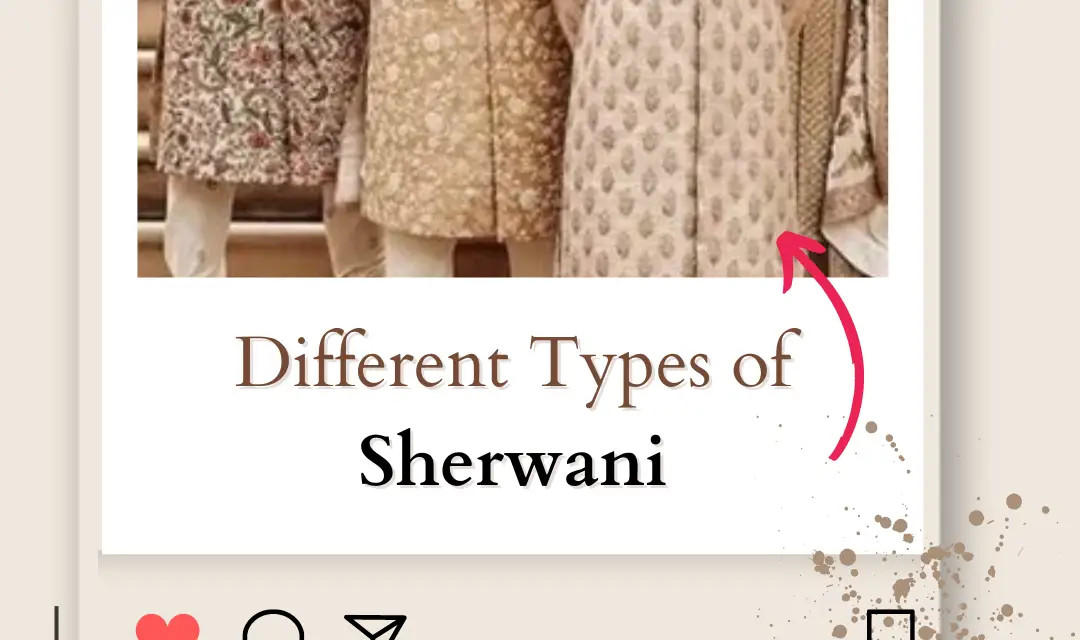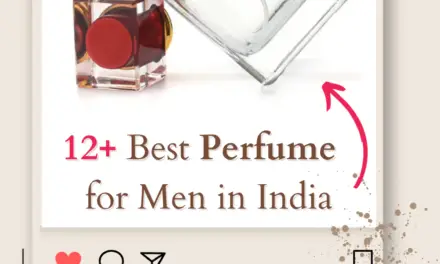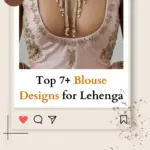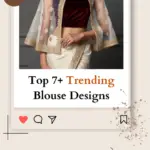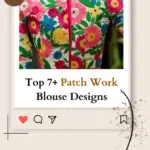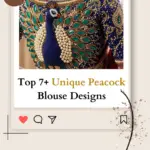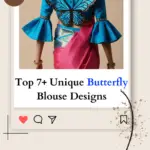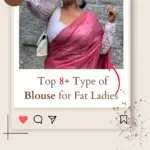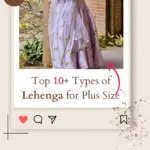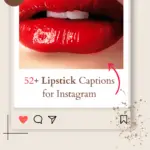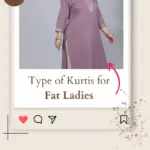What are the Different Types of Sherwanis? The sherwani, a symbol of elegance and cultural significance, transcends its traditional roots to offer a diverse range of styles for the modern man.
From the timeless Achkan to the contemporary Indo-Western, this blog post delves into the various types of sherwanis, helping you navigate this fascinating realm and discover the perfect one for your unique style and occasion.
Note: Measure your Sherwani Size before making an online purchase. & Don’t forget to wear the branded vest under the Sherwani for a complete outfit. and importantly Suit Brands and Sherwani Brands are completely different from each other.
Different Types of Sherwani
| Sherwanis Types | Description | Occasions |
| Achkan | Most common and versatile, long coat-like silhouette with flared hem, बंद (band) collar, short button placket, side slits | Weddings, formal events |
| Jodhpuri | Shorter length, fitted silhouette, inspired by Jodhpur region, closed collar, shorter button placket, breeches | Weddings, receptions, festive occasions |
| Angrakha | Historical style, wrap-around design with side ties/buttons, V-shaped neckline, fitted silhouette | Cultural events, themed celebrations |
| Indo-Western | Modern fusion of Indian and Western styles, slimmer fit, shorter length, western-style collar/button placket | Various occasions |
| Anarkali | Inspired by Anarkali suit, long length, flared silhouette, intricate embellishments | Weddings, special events |
| Short Achkan | A shorter version of Achkan, reaching above the knee | Pre-wedding functions, festive celebrations |
| Printed | Modern take, features printed motifs/patterns | For less formal occasions, seeking a unique style |
1. Achkan Sherwani:
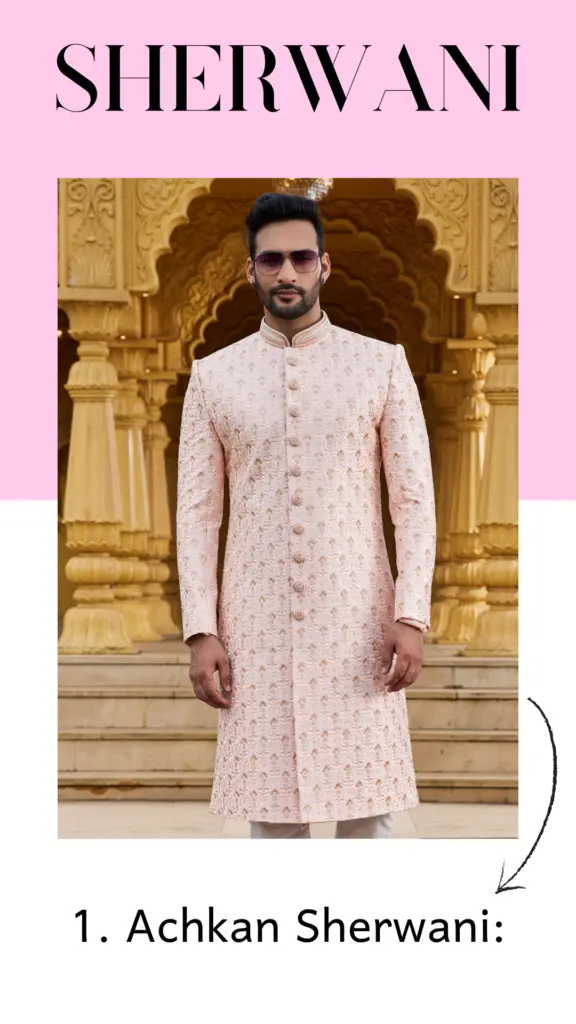
The most common and versatile type, featuring a long coat-like silhouette with a slightly flared hem. It has a बंद (band) collar, a short button placket, and side slits. They are often adorned with embroidery or embellishments, making them suitable for weddings and formal events.
2. Jodhpuri Sherwani:
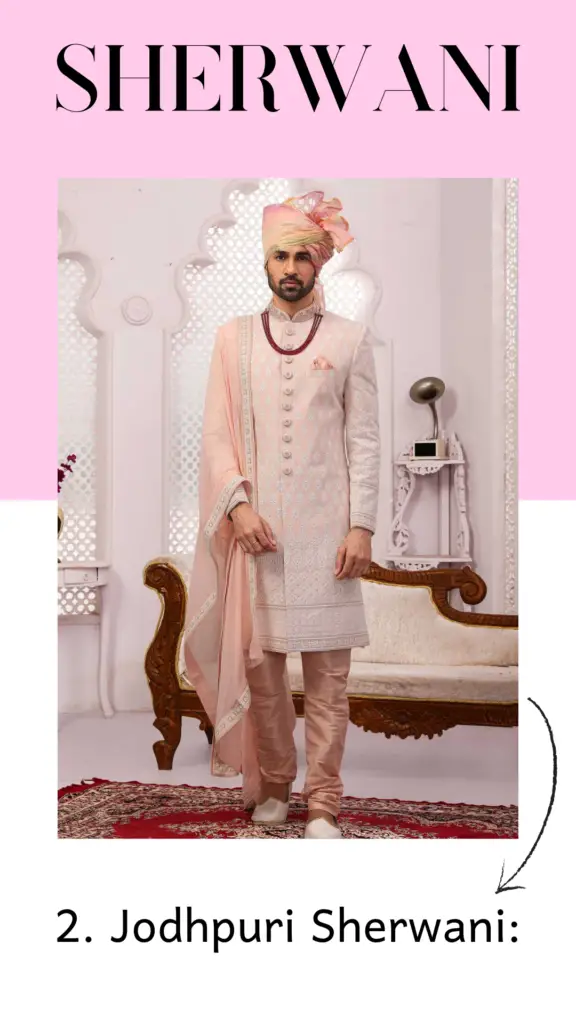
Inspired by the Jodhpur region of Rajasthan, it is known for its shorter length and fitted silhouette. It features a closed collar, a shorter button placket, and breeches instead of a dhoti or churidar pajama. This style exudes a more contemporary and sophisticated vibe, ideal for weddings, receptions, or festive occasions.
3. Angrakha Sherwani:
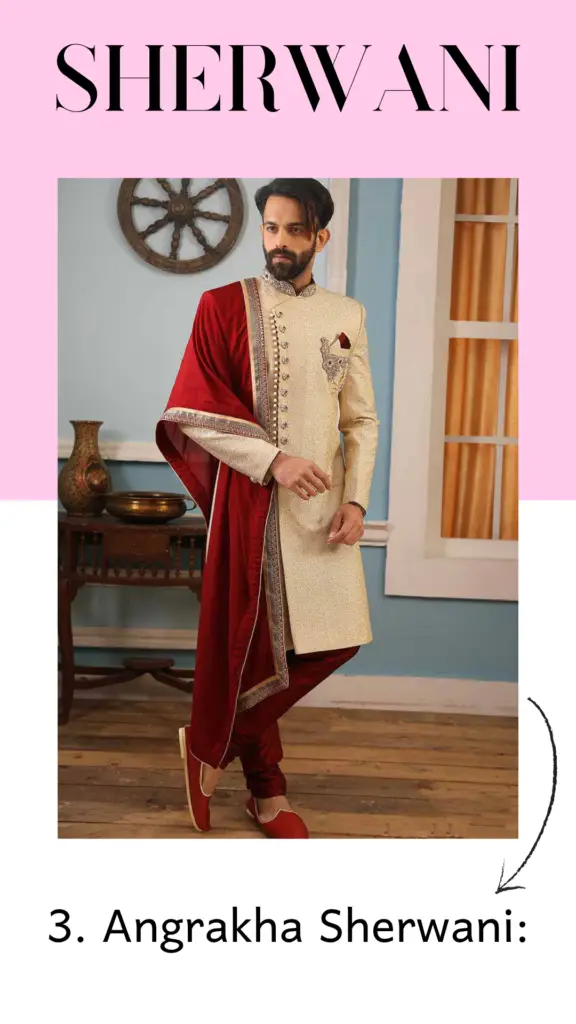
A historical style derived from the Mughal era, featuring a wrap-around design that fastens on the side with ties or buttons. A distinct V-shaped neckline and a fitted silhouette characterize it. It offers a unique and traditional aesthetic, perfect for cultural events or themed celebrations.
4. Indo-Western Sherwani:
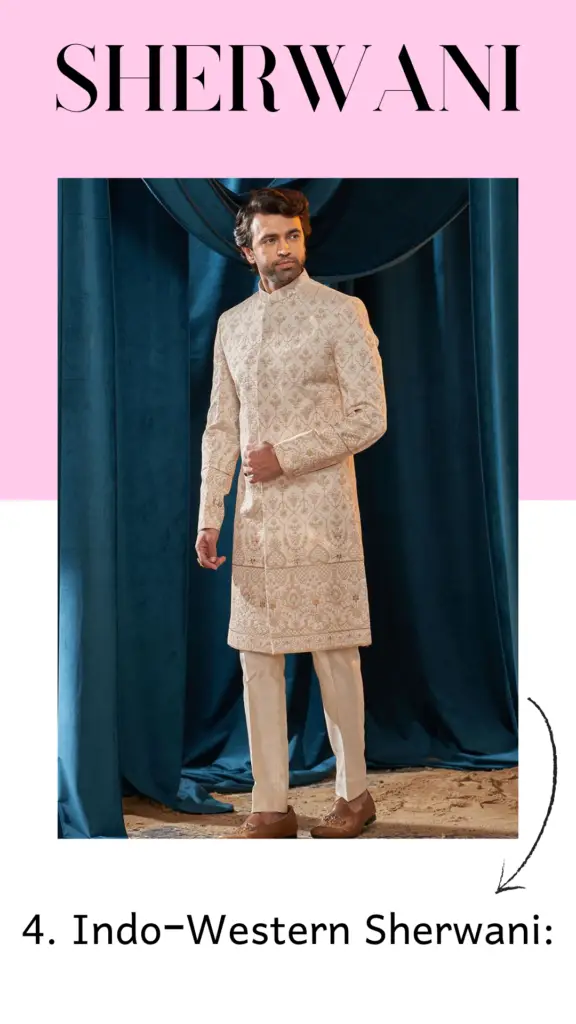
A modern fusion of traditional Indian and Western styles, featuring elements from both aesthetics. This style may incorporate a slimmer fit, shorter length, or a western-style collar and button placket. It caters to those seeking a contemporary twist on the traditional sherwani, suitable for various occasions.
5. Anarkali Sherwani:
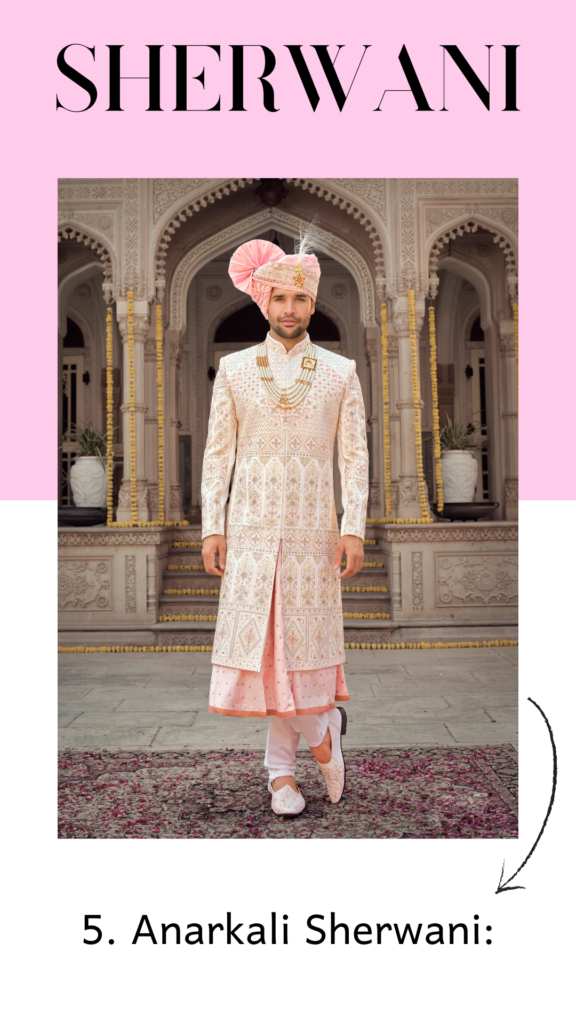
It was inspired by the Anarkali suit, a long, flowing garment traditionally worn by women. It features a longer length, a flared silhouette, and intricate embellishments. Though less common than other types, it offers a unique and eye-catching option for weddings or special events.
6. Short Achkan Sherwani:
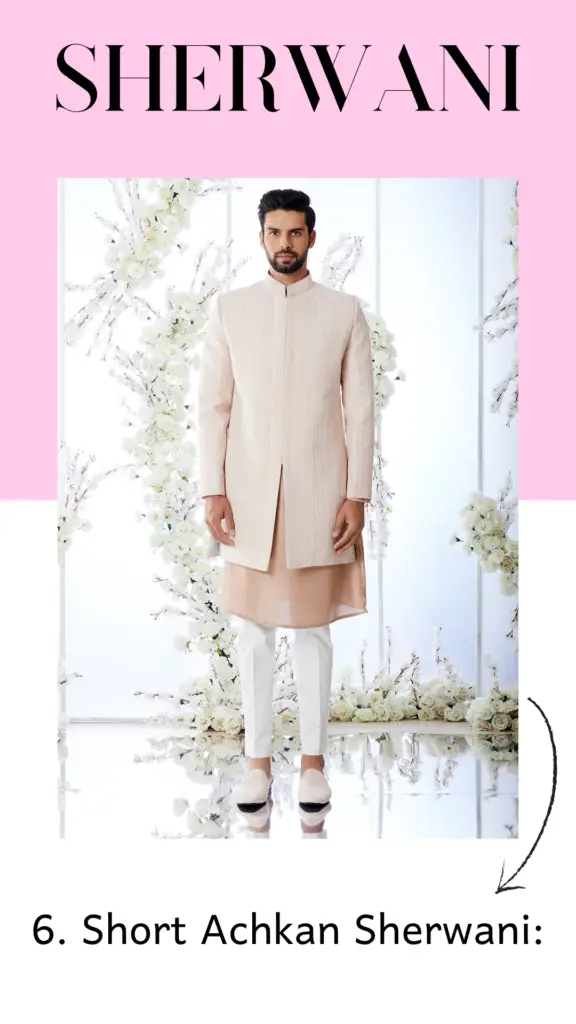
A shorter version of the traditional achkan sherwani, reaching just above the knee. It offers a more relaxed and contemporary look for pre-wedding functions or festive celebrations.
7. Printed Sherwani:
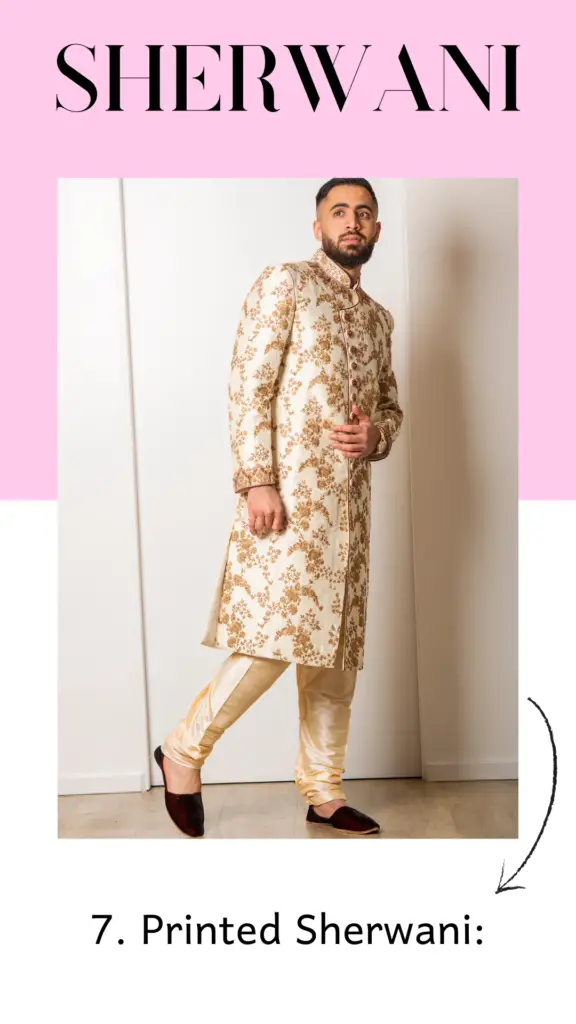
A modern take on the sherwani, featuring printed motifs or patterns on the fabric. It offers a wide range of designs and colors, catering to individual preferences and adding a touch of personality. This style is suitable for less formal occasions or those seeking a unique and stylish look.
Sherwani Styles by Age Group
| Sherwani Age Group | Style Recommendations | Reasoning |
|---|---|---|
| Sherwani for 3-10 Years | Achkan Sherwani (short or knee-length), Angrakha Sherwani | Shorter length and less intricate designs ensure comfort and ease of movement for young children. |
| Sherwani for 11-16 Years | Achkan Sherwani (regular length), Jodhpuri Sherwani (slim fit) | As teenagers mature, they can opt for regular-length achkan sherwanis or the more contemporary Jodhpuri style with a slim fit. |
| Sherwani for 17-19 Years | Achkan Sherwani and Jodhpuri Sherwani, Printed Sherwani (subtle patterns) | Young adults can experiment with bolder colors and patterns while maintaining a youthful and age-appropriate look. Opt for subtle printed sherwanis or classic styles with minimal embellishments. |
| Sherwani for 20-25 Years | Indo-Western Sherwani (sophisticated designs) | This age group can explore the full spectrum of sherwani styles, including classic, contemporary, and bold options. Modern cuts and intricate details can enhance their youthful charm. |
| Sherwani for 25-30 Years | Achkan Sherwani, Indo-Western Sherwani (sophisticated) | As men enter their late twenties, they can gravitate towards sherwanis with a more sophisticated and mature look. Opt for intricate embroidery or richer fabrics in classic or Indo-Western styles. |
| Sherwani for 30-45 Years | Jodhpuri Sherwani (full range of designs), Western Sherwani (luxurious designs) | This age group can embrace bolder and more luxurious styles, showcasing their established style and confidence. Rich fabrics like velvet, intricate embellishments, and statement sherwanis like the Anarkali can be explored. |
Sherwani Styles and Differences:
Jodhpuri vs. Sherwani:
- Jodhpuri: Shorter length, fitted silhouette, closed collar, shorter button placket, often paired with breeches. Inspired by Jodhpur region.
- Sherwani: A broader term encompassing various styles, including the achkan. It can be long or short, with different collars, button plackets, and bottom wear options.
Sherwani vs. Angrakha:
- Sherwani: Evolved from the angarkha, typically featuring a closed front with buttons or a zipper.
- Angrakha: Historical style with a wrap-around design that fastens on the side with ties or buttons, featuring a distinct V-shaped neckline.
Bandhgala vs. Sherwani:
- Bandhgala: A shorter coat reaching the waist or hips, featuring a closed collar and a band (bandhgala) around the waist. Often paired with trousers.
- Sherwani: Generally longer than a bandhgala, reaching the knee or below, with various collar styles and not necessarily featuring a bandhgala.
Finding Your Perfect Sherwani:
Occasion:
- Formal: Classic achkan, rich fabrics, minimal embellishments.
- Weddings: Explore bolder colors/embellishments, and consider theme and role.
- Festive: Vibrant colors, lighter fabrics, playful patterns.
Body Type:
- Lean: Slim-fit, vertical patterns.
- Athletic: Regular fit, balanced proportions.
- Curvier: Comfortable fit, avoid excessive embellishments.
Comfort & Fit:
- Comfortable shoulders, easy movement in sleeves.
- Knee-length or slightly above ankle.
- Breathable fabrics for warmer climates.
Style & Accessories:
- Color: Classic or modern, depending on the occasion.
- Fabric: Silk, brocade, or lighter options for warmer weather.
- Shoes: Formal shoes like Mojris or dress shoes.
- Safa: Coordinate with the sherwani color and complement your face.
- Jewelry: Minimal, use a statement piece like a Branded Watch or cufflinks.
Conclusion: Take your time, tailor if needed, and experiment while prioritizing comfort and confidence. Your perfect sherwani awaits!
FAQs on Sherwani
How do I choose Sherwani?
Choosing a Sherwani It’s essential to focus on fit, comfort, and overall aesthetic appeal. Customization options are often available for a personalized touch.
Is Achkan and Sherwani the same?
While Achkan and Sherwani share similarities, they are not the same. Both are traditional Indian men’s garments, but Achkan typically refers to a shorter, waist-length coat, while Sherwani is a longer coat-like garment. Sherwani is often more formal and heavily embellished.
What is special about Sherwani?
Sherwani is special for its regal and ethnic appeal. It is a traditional Indian outfit, often worn at weddings and special occasions. The richness of fabrics, intricate embroidery, and overall design make Sherwani a symbol of cultural elegance and celebration.
Which state is famous for Sherwani?
Several states in India are known for their Sherwani craftsmanship. However, Punjab, Uttar Pradesh, and Rajasthan are particularly famous for their exquisite Sherwanis. Each region may have its unique style and embellishments.
Is it Jodhpuri or Bandhgala?
Jodhpuri and Bandhgala are distinct styles, but they share certain features. Jodhpuri refers to a style of suit with a longer coat, often resembling a Sherwani. Bandhgala, on the other hand, is a formal suit with a closed-neck coat.

